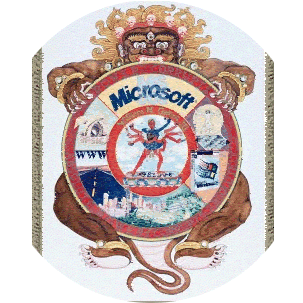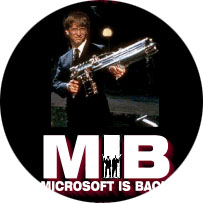-

new lies / old lies / whose lies
Wednesday, December 18, 1997
Ma Bill
Just where the hell do you think you're going today? And what makes you think you can go there without Microsoft?
Bill Gates is big news these days: You can't open the paper without seeing something about the ongoing war between sand-kicking bullies like Janet Reno, Scott McNealy, and Ralph Nader on the one hand, and scrawny little Bill Gates on the other. Never one to miss an opportunity to pile on, I thought I'd grace you with my own views on the subject.
You know about satori, right? The zen state in which you are confronted by the failure of your perceptual model, leading (maybe) to a momentary enlightenment? Or something like that; I'm not big on theory. I do know, though, that I had one of those weird perceptual schisms a while back, and it involved Microsoft.
My current job involves farming out lots of Web work to freelancers. A few months ago I was talking on the phone to someone (let's call him Jerome) who was having a tough time with a project I'd assigned him. The project was a pretty simple one, which was a good thing, as it turned out, because Jerome, despite having represented himself as an HTML expert, apparently didn't understand what a <BODY> tag was. What Jerome did know was how to use Microsoft's Front Page program, which Microsoft promotes as "the easiest way to create and manage great-looking Web sites." It may be easy to use, but it sure made a mess out of Jerome's assignment.
Trying to salvage something for him to do, I asked him to modify some images; resizing and JPEG-ification and whatnot. And he struck out again: This time the culprit was apparently something called "Picture It!", another Microsoft product. In discussing with Jerome where the weird artifacts and spurious background frames in his retouched images were coming from, he made a statement that I will always remember: "I don't understand why I'm having these problems. I mean, this is a Microsoft product, and Microsoft products are always very full-featured and capable."
That statement is what caused my perceptual schism, my moment of satori. I was silent for a few seconds, trying to get a grip on my jumbled thoughts. Here was a cognitive gulf that no amount of explanation or discussion was ever going to bridge. I finally thanked Jerome for his work, told him to bill me for the hours he'd already spent on it, and explained that I'd need to go with someone else for this particular project.
I hung up the phone and sat there, staring into space, remembering.

Bill and I go way back. A decade ago, as cub reporter for an ill-fated technology magazine, I went to Seattle to cover the annual meeting of the Society for Information Management (SIM). SIM was (and still is, for all I know) a crusty cadre of big-iron corporate computing types, middle-aged MIS folk more concerned with maintaining status within the bureauracracy than with keeping up on the latest technology. For that reason, it promised to be a fairly dull meeting. Except for one thing: The keynoter was going to be Bill Gates.
This meant nothing to my editor, who had never heard of him. (Draw your own conclusions from that; I said the magazine was ill-fated.) It apparently didn't mean much to most of the SIMsters, either; the buzz in the banquet room before the keynote mostly concerned the free salmon-bake slated for later that evening (to which, sadly, cub reporters were explicitly not invited). As near as I could tell, Bill got the rostrum that day not because anyone felt he was a particularly significant player, but because Microsoft was based in the area, and Microsoft PR had done some schmoozing with the local SIM chapter.
In 1987, you see, Bill was not yet a pop-culture icon. He was just a garden-variety geek-turned-CEO, of which there were plenty roaming the landscape, none of them likely to show up on the cover of any given Time, Forbes, or People, to say nothing of all three at once. He had money, true, but not the obscene amount of it that makes someone otherwise lacking in personality inherently interesting.
But I knew who Bill Gates was. More importantly, I was very interested in the subject of his talk: the graphical user interface. I had a DOS background, but about six months prior to the convention I'd begun using a Mac to do desktop-published layouts. It hadn't taken long for me to become a big fan of the GUI. I was convinced it was going to be the Next Big Thing in computing, and Bill was too, judging by the number of programmers he'd yanked off their work on profitable application software to pound away at a Mac-like operating system for the PC.
Bill had bet the farm on the GUI, and to succeed he would need to convince this room full of corpulent, pin-striped SIM members that they should pay a little less attention to how to get a sexy title like "Chief Information Officer" and a little more attention to an obscure piece of slow, crash-prone toyware called "Windows 2.0."
I'm not sure what I was expecting; something visionary, I guess. Something like Ridley Scott's "1984" Mac commercial. Something inspirational.
What I got was a nerdy overgrown kid with big glasses giving a 90-minute Windows tutorial. "This is a scroll bar," he explained in his nasal monotone, demonstrating on the huge projected screen. "This little box goes up and down, giving you visual feedback on where you are within the document." And so on.
I had two distinct reactions to Bill's keynote. The first was disappointment: I came all the way to Seattle for this? The second reaction, though, came a few minutes later, as I looked around at all the suits in the audience: They were lapping it up. They were literally on the edge of their seats.
Satori.
These guys liked to joke about the Mac being a computer for preschoolers, about the GUI being a "WIMP" interface (for Windows, Icons, Menus, and Pointing Devices, though they liked the acronym more for its negative connotation than for its descriptive power). But what I realized in that moment was that their verbal abuse masked a deep-rooted insecurity: SIM members walked a constant tightrope between needing to understand technology on the one hand, and needing to blend in with the other techno-disdaining members of upper management on the other. They couldn't play with Windows back in the office, since their bumbling first efforts would destroy the façade of technical omniscience they had so carefully crafted with their bosses. Worse, it would give their rivals an indelible image of the DP guy hunched over a keyboard, squinting at his screen like a lowly secretary.
Among their peers at the SIM convention, though, they could swallow their pride and let young Bill initiate them into the mysteries of the mouse. Bill understood that, far better than I did. He knew exactly what he was doing in that keynote. It wasn't about imparting vision. These guys didn't give a rat's ass about vision. They needed information. They needed to understand this graphical computing thing so they could make an intelligent-sounding response when the CEO asked them about it from the next urinal. They needed an ally in their quest for organizational status, a buddy, a confidant. Bill was happy to oblige. All they had to do was put their faith in him, and he'd take care of them.

Bill has never cared about innovation per se. Innovation is the software industry's stock in trade, of course, and Microsoft didn't become the biggest fish in the pond by clinging to old technology. But Bill realized early on that being the first to market with a new idea doesn't count for squat. CP/M was a new idea: A real operating system for itty bitty computers. Bill took that idea, filed off the serial numbers, and sold it to IBM as PC-DOS, an operating system for IBM's new personal computer. The suits at IBM thought they were getting a great deal; the little geek practically gave them PC-DOS. All Bill wanted in return was the right to sell a compatible version of the software, called MS-DOS, to anyone who might want to sell a cloned version of the PC.
Get that! A PC clone! As if anybody in the business world would buy a computer from someone besides IBM. The IBM guys must have split a gut over that one.

The thing about scrawny little geeks is, they tend to have an intuitive understanding of guerilla warfare. They learn it early on, around 4th grade, the same time they realize they can get the shit kicked out of them by just about any given asshole in their peer group. The only way a nerd like Bill (or me, for that matter) survives to adulthood is to absorb the principles Sun Tzu wrote about in The Art of War: All warfare is based on deception. Hold out baits to entice the enemy. If he is in superior strength, evade him. Pretend to be weak, that he may grow arrogant. Feign disorder -- then crush him.
Bill groks crushing enemies.
The commercial triumph of MS-DOS was just the first of many Microsoft victories; the utter defeat of the Mac OS by Windows was another. And the list goes on. For example, once upon a time there was a program called Persuasion. Aldus had great plans for it. It was the most full-featured, robust application in a category that was growing explosively: business presentation software. It cost $495 a pop, and for a brief, shining moment it was selling like hotcakes.
Microsoft had a competing product, called Powerpoint. Born first on the Mac, it was a pretty much a joke on the PC side. It certainly couldn't hold a candle to Persuasion.
Today, of course, Powerpoint is the only presentation package anyone uses.
You see, it comes bundled with Microsoft Office, the most obscenely profitable commercial product ever conceived. While Microsoft's competitors at Aldus, WordPerfect Corporation and Lotus were still trying to compete on the merits of their individual programs, Bill had shifted to a completely different playing field: the bundled application suite. It didn't really matter that users preferred Persuasion, WordPerfect and Lotus 1-2-3 to Powerpoint, Word and Excel; Bill cares about users even less than he cares about being first to market. His strategy was to go over the users heads, to those same guys he had courted so successfully at the '87 SIM convention: the suits who buy this stuff.
Bill made buying Office easy. You got a word processor and a spreadsheet program, which every user in the organization needed, for roughly the same price as buying WordPerfect and Lotus 1-2-3. But then Bill practically gave you a presentation package and a database program. For free! Who could say no?
No one, apparently. Today, of course, the Office applications have become the most capable products in their respective categories. But that's not saying much, since the competition was effectively blown to smithereens a couple of whole-number versions ago by Bill's fire-sale pricing. Business application software is now a Microsoft monopoly, and like all monopolists, Bill is in the driver's seat when it comes to enhancing and maintaining his product line. There have been some fairly noticeable bugs in Excel's formatting routines since version 1.0, for example, but don't expect them to be fixed anytime soon. Nor should you expect to see Powerpoint sporting some of the slick features Persuasion offered nearly a decade ago.
That battle is over. Today Bill has his troops marching on a whole new objective: the Internet.

There's really nothing new in Bill's all-out war on Netscape, Sun, and the other Net-centered companies that are the latest threat to his domination of the world's desktops. As before, Bill is pursuing a simple strategy:
- Get your hands around the other guy's neck.
- Squeeze as hard as you can.
- Don't ease up until the corpse is cold.
In the case of Netscape, this has meant cutting off any conceivable source of revenue. Rush a buggy, piece-of-crap browser to market (and that's what Internet Explorer is, even in version 4.0, no matter how much good press Bill buys with his ad dollars). Don't just give that browser away, but actually pay people to use it (via third-party freebies like subscriptions to the Wall Street Journal and Sportszone). Then bundle a Web server into NT and give that away while promoting it to the heavens, even if it basically sucks eggs in any kind of comparison with Netscape's server, to say nothing of Apache running under Unix.
When Bill started on this Internet kick, Microsoft's offerings were viewed as a joke by those who knew what real Internet software could do. And I'm sure this suited Bill just fine, since it kept his enemies from taking him seriously.
Just one example of how ludicrous some of Microsoft's Net initiatives have been: About two years ago, when the Exchange E-mail server was about to be unveiled, a good Net-buddy of mine named Mark got some E-mail from a Microsoft employee who was in trouble because of a prank. Mark had set up a Web page that would let you send E-mail with an arbitrarily chosen "From:" header; you just filled in the form, hit a button, and off it went. On the Internet, where E-mail headers are considered more a broad hint than any kind of reliable identifier, this sort of thing is commonplace, and doesn't cause undue alarm; it's just kids having fun.
Anyway, this guy from Microsoft had used Mark's WaCkYmAiL script to send some E-mail to one of his cubicle buddies, putting the infamous "billg@microsoft.com" in the From: field. (Factoid: In the six months he had the script running, Mark reported that by far the two most popular bogus addresses were billg@microsoft.com and that of another famous Bill, pres@whitehouse.gov.)
So far so good, but get this: Once the mail in question had entered Microsoft's network via the company's Exchange gateway (which was being tested internally in anticipation of the big rollout), there was no way to distinguish it from mail actually sent by Bill himself! When the recipient made a tongue-in-cheek reply to the missive, it didn't go back to its real point of origin (which would have sent it to the postmaster account at my friend Mark's server). Instead it went straight to the boss's desk -- and there was nothing in the Exchange server's audit trail to show that the original message had not come from there in the first place.
In other words, the software that Microsoft was about to release to the world, hailing it as the definitive solution for all those MS Mail sites clamoring for Internet gateway capability, was so poorly implemented that it could be subverted with no more expertise than was required to fill in a bogus From: address. This is typical of what passes for "security" in the Microsoft world, and like ActiveX as an answer to Java, it makes a certain twisted kind of sense: If everyone in the world was required to run Microsoft software (now there's a Bill Gates wet dream), that type of security would work. After all, Microsoft users can't lie to the mail server.
The discovery of this problem with the Exchange server at such a late point in the game had caused much consternation in Redmond; the original prankster was trying to enlist my friend Mark's help in explaining to his bosses exactly what had happened in a desperate effort to hang onto his stock options.
I never learned what happened to the guy. Exchange, of course, was rolled out to its unsuspecting customers, with nary a word about its incredible gullibility. I suppose it has been made a little less trusting by now; let's hope so, at least.
Despite howlers like this one, though, it's increasingly obvious that Microsoft is going to win its Internet campaign, just like it has won every battle before this. The latest projections (real projections, I mean, not the hype Microsoft peddles) show Microsoft passing Netscape in terms of browser market share sometime in late 1998 or early 1999. Whether or not Bill succeeds in fooling a federal judge into believing IE really is an integral part of the Windows operating system, that's exactly what it will be by the beginning of the new millenium, a cancerous growth with tendrils extending throughout your computer, impossible to eradicate except by a course of surgery and chemo so radical that its side effects would surely be worse than submission to the disease. At that point, "using the Internet" will be synonymous with "using Microsoft," at least for those users unfortunate enough to have bought into Bill's promise of easy, robust, cheap solutions (or unfortunate enough to work at a company whose IT decision-makers have done so).

I didn't use to hate Bill Gates so passionately. And I have to admit that his basic approach hasn't changed one jot since the days when I saw him as benign, or even beneficial. Part of the difference is that today, Bill has the money and power to do a lot more damage when he launches one of his scorched-earth campaigns. Like an inner-city teen with a bad attitude, he's one sort of problem when knifing other kids in his own neighborhood, and another sort entirely when knocking over banks with automatic weapons.
But more than that, I have changed. Between the first time I saw Bill and today, I've crossed computerdom's Continental Divide, going from the world of DOS/Windows/Mac to the world of Unix.
There was a time, back when I first started using Unix, that I made shell scripts to duplicate all the common DOS commands: mapping "dir" to "ls -l", "delete" to "rm", "copy" to "cp", and so on. About a year ago, though, I found myself doing the same thing in reverse: making DOS batch files called "ls.bat," "rm.bat," and "cp.bat" for those rare occasions when I had to poke around in the DOS intepreter under Windows 95. I had begun thinking in Unix, and once that paticular genie is out of the bottle it's impossible to put it back.
Unix users refer to Windows as a "bondage and discipline" operating system, and I've come to realize how true that is. It's a proprietary, closed environment. Trust me, Bill says, and I will solve all your problems, giving you simple, stable, powerful solutions that run right out of the box. If you take the bait, though, you quickly find yourself trapped, enduring bugs, slipped shipping dates, and missing features, with little recourse but prayer. You get cute icons and flashy rollout ceremonies, but God help you if you actually need to tie some heterogenous data together: If the Windows tool to do it doesn't exist (and chances are it won't, unless your particular need has been targetted as a stretegic necessity by Ma Bill), you're stuck.
Unix is different. It's an open environment, a global potlatch with zealots competing to see who can create and give away the coolest stuff. You are limited not by what Bill Gates has decided is the most profitable package he can sell you, but by the boundaries of your and your fellow zealots' skill and imagination. It was designed as a toolbox, not a playpen.
It's a revolutionary idea. It's no accident that the Internet was built, not by Microsoft and its minions, but by those wacky Unix folks. O'Reilly & Associates has a great book (one of many) called Unix Power Tools; on the cover is a gritty, 1950s-era, maximum-torque electric drill. It's the kind of thing you'd see in an auto mechanic's shop, and it's the perfect image to represent Unix. After you've had a taste of that, any given Windows program comes off like something made by Playskool out of brightly colored plastic: My First Web Server.
It doesn't matter, though. Windows users represent a captive market, and Bill holds the keys. A million MIS departments have sold him their computational souls, and he isn't about to let them off the hook. He knows their innermost fears and desires, and how to play upon those fears and desires to achieve his own ends. He will continue to give them "solutions" that are just barely good enough to keep them from getting fired, while making sure that at each step they give up just a bit more freedom, are tied just a bit more tightly into his realm, are just a bit less capable of considering any other option.
He's at the front of the Internet parade now, or close enough that it makes no difference, waving his banner for all it's worth, shouting "I'm the leader. Follow me!" And the poor Microsoft users are doing just that, skipping gayly along behind him, deaf to the warnings of their Unix brethren, secure in the knowledge that, as Jerome put it, "Microsoft products are always very full-featured and capable."
Chalk up another one for the Pied Piper of Redmond.

new lies / old lies / whose lies
Logo graphics created with Pixelsight.
-




















